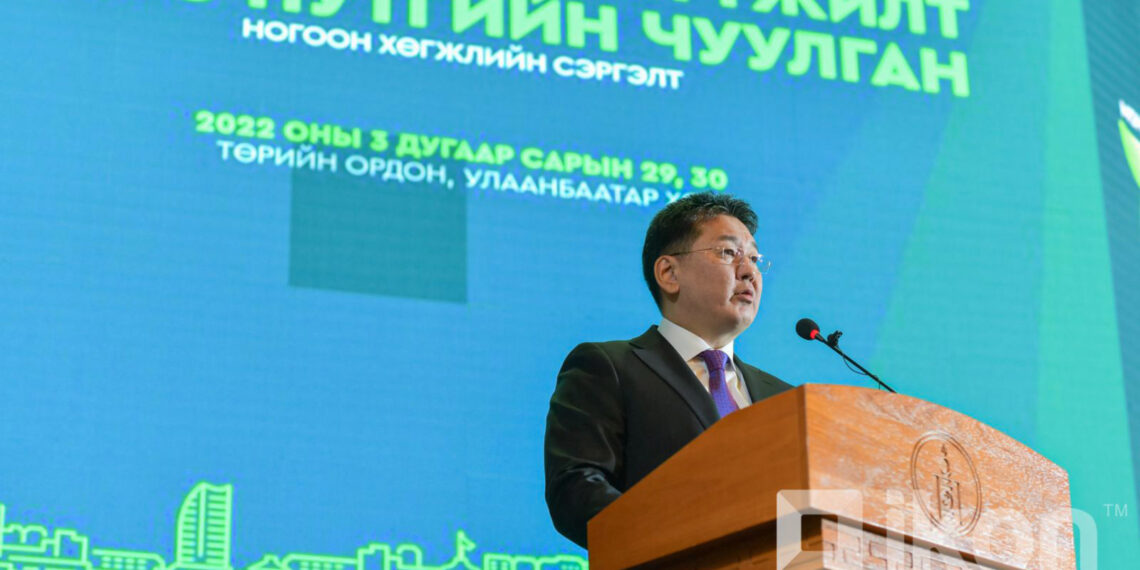Under the auspices of the President of Mongolia, a ’Green Finance Regional Forum’ was held at Government palace on 29-30, March. We are delivering an abridged version of the opening remarks made by the President of Mongolia.
Dear distinguished guests,
Climate change has become an existential threat to humanity and scientists, researchers, world leaders and the international community are paying a lot of attention to this problem. Though each and every country has been making an effort to fulfill their goals and climate change pledges, the negative impact due to climate change is still intensifying.
Humanity is facing a pandemic crisis and COVID-19 made us aware that we must take bold and decisive steps to benefit the world and change our attitude towards nature. Today, the world is facing major health, social and economic challenges, but we must not rest on our laurels in our fight against climate change.
Over the past 170 years, global surface temperatures have risen by 1.09 percent, and many biological species have become extinct or are seriously endangered. Despite emitting only 0.1 percent of the world’s greenhouse gas emissions, Mongolia is one of the countries that is most affected by climate change. Specifically, climate change has intensified over the past 80 years in Mongolia, with the average air temperature increasing by 2.25 degrees, which is twice the global average.
In Mongolia, almost 77 percent or 120 million hectares of our total territory is affected by desertification, and half of the total area is classified as severely affected. Compared to 1990, the number of climate change-related natural disasters has tripled in Mongolia in the last decade. 66 countries in the world have pledged to reduce their greenhouse gas emissions to zero by 2050. In a document dated 2016, Mongolia set a goal to reduce its greenhouse gas emissions by 22.7 percent by 2030. During the UN Climate Change Conference 2021 held in Glasgow, UK, Mongolia announced that it is possible to increase the target level to 27.2 percent by introducing advanced technology and innovation and increasing green financing.
In Mongolia, almost 77 percent or 120 million hectares of our total territory is affected by desertification, and half of the total area is classified as severely affected. Compared to 1990, the number of climate change-related natural disasters has tripled in Mongolia in the last decade. 66 countries in the world have pledged to reduce their greenhouse gas emissions to zero by 2050.
With the aims of increasing renewable energy and further improving the energy supply in Northeast Asia, Mongolia supports the Asia Super Grid Initiative and is cooperating with countries in the region using abundant solar and wind resources. Mongolia has also launched a national movement to plant and protect One billion trees by 2030 and will focus on increasing greenhouse gas absorption, reducing deforestation and land degradation, promoting rehabilitation activities, and preventing water scarcity.
We, Mongolians say “Water is a source of life, and trees are a source of water”.
Experts consider that the One Billion Trees movement will have a significant impact on reducing dust storms that are causing ecological and health threats not only in Asia but also in the Americas. The movement will have multiple socio-economic benefits such as creation of jobs, reduction of poverty, improvement in food supply, increased production of seedlings, fertilizers and pesticides as well as others. It will also play an important role for the protection and reproduction of rare and endangered medicinal plants, animals and keep the ecosystem in balance.
The involvement, leadership and cooperation of international investors and the domestic financial sectors is critical to green growth financing. Scientists, researchers and industry experts advise that the government should establish financial mechanisms such as a Green Investment Corporation, a Green Fund against Climate Change, and a Green Loan Guarantee Fund to support green growth. At a time when international organizations, investors and donors are paying special attention to environmental issues and prioritizing green growth, Mongolia needs to increase its green financing and improve its structure.
We, regional countries, international organizations, governments, the private sector and citizens should all look in one direction and implement coherent policies and decisions in order to combat climate change, desertification and dust storms, protect mother nature and pass on a green future to future generations.
I would like to emphasize that mutual understanding and cooperation between the countries of the region are of paramount importance in achieving this goal.






